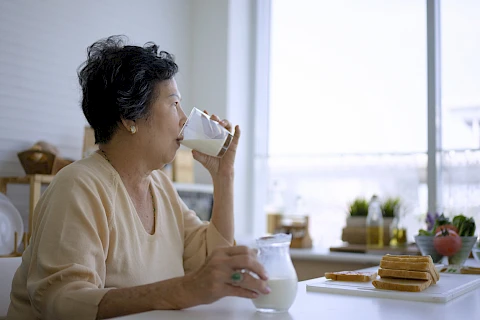
As we age, maintaining good health becomes increasingly important. A balanced diet rich in essential nutrients is critical to the well-being of seniors. One nutrient that barely gets any attention is Vitamin D.
The "sunshine vitamin" is integral in maintaining strong and healthy bones. Unfortunately, many seniors lack sufficient Vitamin D, putting them at risk for various health problems, including osteoporosis. Including Vitamin D in senior diets is instrumental in preventing many age-related health issues.
The Significance of Vitamin D
Vitamin D is a fat-soluble vitamin that helps the body absorb calcium, known for its role in bone health. By aiding calcium absorption, vitamin D helps build bones and prevents them from weakening and softening. It is a concern for seniors, as the risk of osteoporosis and fractures increases with age. Vitamin D deficiency prevents the body from absorbing calcium effectively, leading to thinner, weaker, and brittle bones.
Sources of Vitamin D
Sunlight is a natural source of Vitamin D. Exposing the skin to the sun produces Vitamin D. However, a significant percentage of seniors might not get enough sunlight exposure to produce sufficient Vitamin D. This could be due to factors like living in higher latitudes, having darker skin, or spending too much time indoors.
Incorporating Vitamin D-rich foods into your diet can help. These are primarily fatty fish like salmon, mackerel, and tuna. Other sources include beef liver, cheese, and egg yolks. Certain foods, like dairy products, orange juice, and cereals, are also often fortified with Vitamin D.
Adding Vitamin D to Senior Diets
Incorporating Vitamin D-rich foods into your diet requires some planning so it feels less burdensome. Start by gradually adding more servings of fatty fish to your weekly meal plans. Experiment with various recipes to keep the diet exciting. Grilled salmon, tuna salads, or omelets with cheese and yolks are some simple ways to boost Vitamin D intake.
Another clever way to increase Vitamin D is by choosing fortified foods. Swap your regular dairy products with fortified items. Consider starting your day with a bowl of fortified cereal and a glass of orange juice to meet your daily requirements.
Considering Vitamin D Supplements
Sometimes, diet and sunlight exposure may not be enough to maintain optimal Vitamin D levels, especially for seniors living in areas with less sunlight. Vitamin D supplements can be an alternative. Always consult with a healthcare provider before starting any supplement regimen. They can guide you on the correct dosage and monitor potential side effects. Too much Vitamin D can be harmful and cause other health problems.
Contact Senior Helpers for Top-Notch In-Home Care Services
Beyond bolstering bone health, prioritizing Vitamin D in a senior's diet can make a difference in a senior's quality of life. With a proactive approach to nutrition and safe supplementation, seniors can enjoy a healthier, more vibrant lifestyle for years to come.
At Senior Helpers Northwest Indiana, we understand the unique needs of seniors and are dedicated to providing the necessary support to ensure their well-being. We offer in-home senior care solutions tailored to the needs of the older adults in the community. If you live in Crown Point, Gary, Hammond, Lake County, or East Chicago, contact us for a personalized approach to senior care, including advice on optimal nutrition.